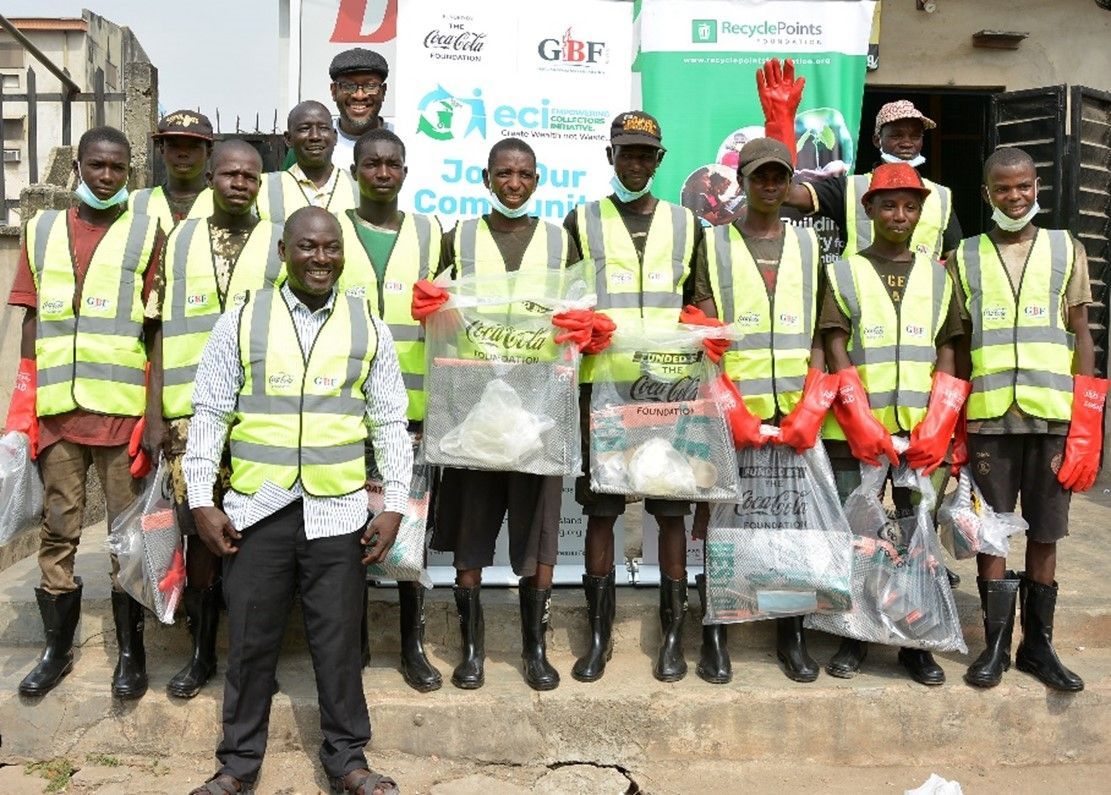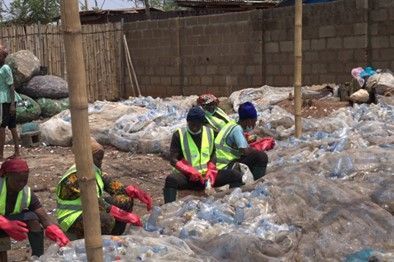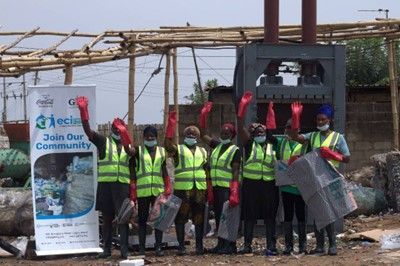The Coca-Cola Foundation Advances Sustainable Waste Management and Elevates Decent Work for Women in Nigeria
Elevating SDG 1 - No Poverty, SDG 2 - Zero Hunger, SDG 3 - Good Health and Well-Being, SDG 5 – Gender Equality, SDG 9 - Industry, Innovation and Infrastructure, SDG 11 - Sustainable Cities and Communities, and SDG 17 - Partnership for the Goals
With a staggering population of 220 million, Nigeria faces an alarming 2.5 million metric tons of plastic waste produced annually due to improper disposal practices and inadequate waste management. These practices cause severe environmental, social, economic, and health consequences. As of 2022, Nigeria also had over 133 million residents living below the poverty line, with an unemployment rate of 33%.
"Empowering Collectors Initiative" (ECI) leverages on the Sustainable Development Goals (SDGs) and the Ten Principles of the United Nations Global Compact to tackle plastic pollution in Nigeria. The vision is to trigger a thriving circular economy for plastic waste in Nigeria and subsequently in Africa. By addressing inefficiencies in waste collection and recycling, the initiative aims to turn environmental challenges into economic opportunities and generate jobs for women and youth.

Youth beneficiaries of the Coca-Cola Foundation "Empowering Collectors Initiative" receiving their waste collection kits.
In just 6 months since the launch of ECI, 145,320,000 million plastic items were removed from the environment across 6 states of Nigeria. The initiative aims to create an economic ecosystem that would not only have a positive impact on the environment but would also provide women and youth with knowledge and skills in the waste management value chain – enabling their economic empowerment and in turn improving quality of life for their families.
Saadia Madsbjerg, President of The Coca-Cola Foundation explained that the idea of the initiative was to create an economic ecosystem that would not only support environmentally beneficial actions but would also provide women with skills and trainings in the waste management value chain – enabling their economic empowerment and in turn improving quality of life for their families.
According to Saadia, “our commitment is to continue to enable the empowerment of women and youth in as many communities as we can, providing them with the necessary knowledge required to improve their capacity to generate wealth in a more sustainable way and with a positive impact on our environment. We must strive to create positive and lasting socio-economic transformations and the UN Global Compact's emphasis on collaboration and stakeholder engagement means that together, we can drive significant and meaningful change”.

Saadia Madsbjerg, President of The Coca-Cola Foundation
Launched in 2022 and implemented in partnership with Growing Businesses Foundation (GBF), the first phase of the initiative has already achieved over 7,126 metric tons of its target to recover up to 25,000 metric tons of plastic waste from the environment over a 24-month period. ECI has also employed over 1,578 of the target 3,000 women and youths as collectors at the community level, increasing their household incomes while combating widespread poverty in Nigeria.
Through partnership with the Recyclers Association of Nigeria (RAN), the program works alongside 10 aggregator partners selected through a global standard due diligence exercise. The initiative is empowering these aggregators with assets such as recycling machines and power generators, working capital, and mentoring.
By running advocacy campaigns in their communities, ECI also works to change social behaviors about plastic disposal which enhance the business impact and profitability of the aggregators. A comprehensive, digital, data collection system is in place to collect and compile crucial information. The system monitors the progress made by each aggregator to ensure alignment with set targets and to address any challenges encountered along the way.
The Empowering Collectors Initiative addresses multiple Sustainable Development Goals (SDGs), such as SDG 1 - No Poverty, SDG 2 - Zero Hunger, SDG 3 - Good Health and Well-Being, SDG 5 – Gender Equality, SDG 9 - Industry, Innovation and Infrastructure, SDG 11 - Sustainable Cities and Communities, and SDG 17 - Partnership for the Goals.

Workers at one of the aggregator’s collection sites
Executive Director of the UN Global Compact Network Nigeria, Naomi Nwokolo speaking on the ECI initiative noted the increased interest by corporate organizations in Nigeria to create real, sustainable change.
“Each year, we see more organizations like The Coca-Cola Foundation guided by the Ten Principles of the UN Global Compact and using the frameworks of the Sustainable Development Goals (SDGs) to build quality, sustainability initiatives. The private sector has a crucial role to play in development, and we are guiding our participating companies through their sustainability journey to ensure they are on the right path. We are therefore very excited about the multidimensional impact that the Empowering Collectors Initiative is having in Nigeria’s waste management ecosystem.” she noted.

Naomi Nwokolo, Executive Director, UN Global Compact Network Nigeria.
By enhancing the collection and processing capabilities of Aggregators and Collectors and by expanding the provision of assets and mechanisms to a greater number of participants within the ecosystem, the initiative aims to increase the recycling rate of PET waste from the current 10% to a full 100% by 2030. Based on figures from the first phase, this should generate up to 30,000 jobs for women and youth. This will not only reduce pollution and enhance drainage systems but also create significant economic value for the country.

Females and youths are top beneficiaries of the Coca-Cola Foundation-funded "Empowering Collectors Initiative".
Learn more about the programs of the UN Global Compact Network in Nigeria.
